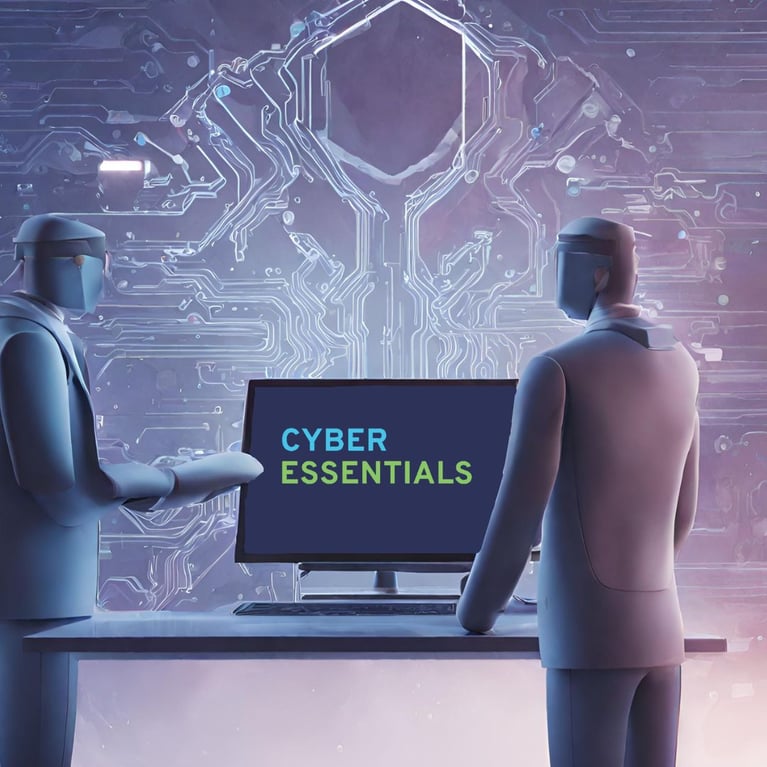What is Cyber Essentials Certification and Why Do Organisations Need it?
In today's digital world, cyber-attacks and security breaches are increasingly common, and organisations need to take steps to protect themselves from such threats. One way to do this is by obtaining Cyber Essentials Certification. In this article, we will explore what Cyber Essentials Certification is, the difference between Cyber Essential, Cyber Essentials Plus, and the Cyber Essentials Scheme, and why organisations need it.
Cyber Essentials Certification Explained
Cyber Essentials is a government-backed certification scheme that helps organisations guard against the most common cyber threats and demonstrates their commitment to cyber security. The certification process involves a self-assessment questionnaire that assesses an organisation's ability to protect itself against cyber-attacks. Cyber Essentials certification is valid for 12 months and offers a sound foundation of cyber security measures that all types of organisations can implement to mitigate the risk from common cyber-attacks.
Cyber Essential, Cyber Essentials Plus, and the Cyber Essentials Scheme
The Cyber Essentials certification scheme has three different levels: Cyber Essential, Cyber Essentials Plus, and the Cyber Essentials Scheme.
Cyber Essential is the basic level of certification and involves a self-assessment questionnaire that assesses an organisation's ability to protect itself against common cyber-attacks. This certification is ideal for small businesses and organisations that do not have complex IT systems.
Cyber Essentials Plus is the second level of certification and involves a more rigorous assessment process. This certification requires an on-site assessment and vulnerability scan, as well as the completion of the self-assessment questionnaire. Cyber Essentials Plus certification is ideal for organisations that have more complex IT systems and want a more comprehensive assessment of their cyber security.
The Cyber Essentials Scheme is an industry-supported scheme that provides incentives for businesses to become Cyber Essentials certified. This scheme is designed to encourage organisations to take cyber security seriously and to implement measures that all types of organisations should have in place to protect against cyber threats.
Why Do Organisations Need Cyber Essentials Certification?
Obtaining Cyber Essentials Certification is essential for any organisation that wants to protect itself from cyber-attacks and demonstrate its commitment to cyber security. The UK government requires Cyber Essentials certification for all suppliers bidding for central government contracts that involve handling sensitive and personal information.
In addition to being a requirement for government contracts, Cyber Essentials certification helps organisations protect themselves against common cyber threats such as malware and phishing attacks. It also provides assurance to customers and partners that an organisation takes cyber security seriously and has the necessary controls in place to protect against cyber-attacks.
How to Get Cyber Essentials Certified
To become Cyber Essentials certified, organisations need to meet the requirements for Cyber Essentials certification. This involves completing a self-assessment questionnaire and implementing the necessary technical controls to protect against common cyber threats.
Organisations can also seek the help of a certification body or assessor to guide them through the certification process. The certification body will conduct an audit of the organisation's cyber security measures to ensure that they meet the requirements for Cyber Essentials certification.
Readiness for Cyber Essentials Certification
Before seeking Cyber Essentials certification, organisations should ensure that they have the necessary cyber security measures in place. This includes implementing technical controls such as firewalls and anti-malware software, as well as ensuring that employees are aware of the risks of cyber-attacks and are trained to identify and report potential threats.
The Difference Between Cyber Essential, Cyber Essentials Plus, and the Cyber Essentials Scheme
While all three levels of Cyber Essentials certification aim to protect organisations against common cyber threats, they differ in terms of their assessment process and the level of assurance they provide. Cyber Essential is the basic level of certification and involves a self-assessment questionnaire.
Common Cyber Security Questions:
How is cybersecurity important?
Cybersecurity is critically important in today's digital world because it helps protect sensitive data, maintain the confidentiality, integrity, and availability of information, and defend against unauthorized access and cyberattacks. The increasing reliance on technology and the internet has led to an upsurge in cyber threats, which can result in financial losses, damage to an organisation's reputation, and even compromise national security. Cybersecurity safeguards not only businesses and governments but also individuals, by protecting personal information and ensuring the safe use of digital services.
What is a cybersecurity policy?
A cybersecurity policy is a formal document outlining an organisation's rules, guidelines, and procedures to manage and protect its information systems and digital assets. This policy establishes the foundation for an organisation's cybersecurity posture and provides a framework for identifying, assessing, and mitigating risks associated with information technology. A well-defined cybersecurity policy typically covers areas such as access control, incident response, employee training, data protection, and system maintenance, ensuring a comprehensive approach to cybersecurity management.
Do cybersecurity engineers code?
Cybersecurity engineers may be involved in coding as part of their job responsibilities, depending on their specific role and the organisation they work for. While not all cybersecurity engineers focus on coding, some develop or customise security tools, write scripts for automating processes, or create programs for analysing and responding to security incidents. Having a strong foundation in programming languages like Python, JavaScript, or C++ can be beneficial for cybersecurity engineers, as it enables them to better understand and address security vulnerabilities in software.
Why is cybersecurity important?
Cybersecurity is important for several reasons:
Protection of sensitive data: Cybersecurity measures help safeguard confidential information, such as financial records, personal data, and intellectual property, from unauthorised access and theft.
Business continuity: A robust cybersecurity strategy ensures that organisations can continue operating despite cyber threats, minimising downtime and the associated financial and reputational costs.
Compliance with regulations: Many industries, such as healthcare and finance, have specific regulatory requirements related to data protection and cybersecurity. Implementing strong cybersecurity measures helps organisations maintain compliance and avoid penalties.
Trust and reputation: Effective cybersecurity practices help build trust with customers, partners, and stakeholders, demonstrating an organisation's commitment to safeguarding their information.
National security: Protecting critical infrastructure and government systems from cyber threats is crucial for maintaining national security and preventing potential disruptions to essential services.
Is Cyber Essentials UK only?
Yes, Cyber Essentials is a UK-specific certification scheme, introduced by the UK government in 2014. Its purpose is to help organisations of all sizes demonstrate their commitment to cybersecurity by implementing a set of basic security controls. However, while the scheme itself is UK-based, the principles and practices it promotes are universally applicable and can benefit organisations outside the UK as well.
How long does Cyber Essentials take?
The time it takes to achieve Cyber Essentials certification depends on the current state of your organisation's cybersecurity measures and the resources you allocate to implement the required controls. Generally, smaller organisations with a less complex IT infrastructure can complete the process more quickly, possibly within a few weeks. For larger organisations or those with more complex systems, the process may take a few months.
Who needs Cyber Essentials?
Cyber Essentials is designed for organisations of all sizes and across all sectors. The scheme is particularly valuable for businesses that handle sensitive data or provide online services, as it helps demonstrate their commitment to cybersecurity best practices. Additionally, the UK government requires organisations bidding for certain government contracts to have Cyber Essentials certification, making it essential for businesses seeking to work with the public sector.
Is Cyber Essentials mandatory?
Cyber Essentials is not mandatory for all organisations in the UK. However, it is a requirement for businesses that wish to bid for certain UK government contracts, especially those involving sensitive data handling or the provision of certain technical services. Even when not mandatory, achieving Cyber Essentials certification can be beneficial as it demonstrates an organisation's commitment to cybersecurity and helps build trust with customers, partners, and stakeholders.
How much is Cyber Essentials?
The cost of Cyber Essentials certification varies depending on the certification body you choose and the level of support you require during the process. Prices typically start around £900 for the basic Cyber Essentials certification, while the more comprehensive Cyber Essentials Plus certification, which involves a more in-depth assessment, may cost between £1,500 and £3,000 or more.
How many companies have Cyber Essentials?
Over 30,000 organisations have achieved Cyber Essentials certification. More businesses recognise the value of demonstrating their commitment to cybersecurity best practices.
Does Cyber Essentials include insurance?
Cyber Essentials certification itself does not include insurance. However, some insurance providers may offer discounts or more favorable terms for organisations that have achieved Cyber Essentials certification, as it demonstrates a proactive approach to cybersecurity and risk management. It's essential to consult with your insurance provider to understand how your Cyber Essentials certification may impact your coverage or premiums.
Is Cyber Essentials a standard?
Cyber Essentials is not a formal standard like ISO or IEC standards; rather, it is a certification scheme introduced by the UK government to encourage organisations to adopt basic cybersecurity measures. It provides a set of simple yet effective controls that, when implemented, help protect organisations from common cyber threats.
Is Cyber Essentials the same as ISO 27001?
No, Cyber Essentials and ISO 27001 are not the same. While both focus on cybersecurity, ISO 27001 is a comprehensive international standard for establishing, implementing, and maintaining an Information Security Management System (ISMS). ISO 27001 certification involves a more rigorous and in-depth assessment process than Cyber Essentials.
In contrast, Cyber Essentials is a UK-specific certification scheme that provides a baseline for cybersecurity measures. It is less comprehensive than ISO 27001 and primarily focuses on basic security controls. Some organisations choose to pursue both certifications, as they complement each other and demonstrate a strong commitment to cybersecurity.
What is Cyber Essentials IASME?
IASME Consortium is an accreditation body for Cyber Essentials that also offers the IASME Governance standard, which is designed to help small and medium-sized organisations implement a simple yet effective cybersecurity management system. The IASME Governance standard includes Cyber Essentials certification and offers additional controls and guidance that align with international standards like ISO 27001, but are tailored for smaller businesses with fewer resources.
How do I get a Cyber Essentials badge for my organisation?
To obtain a Cyber Essentials badge for your organisation, follow these steps:
Choose an accredited certification body: Visit the official Cyber Essentials website to find a list of accredited certification bodies.
Review the requirements: Familiarize yourself with the Cyber Essentials requirements and ensure your organisation's IT systems and processes meet these standards.
Complete a self-assessment questionnaire: Answer a series of questions about your organisation's cybersecurity practices.
Submit the questionnaire for review: The certification body will review your responses and determine if your organisation meets the Cyber Essentials requirements.
Certification: If your organisation meets the requirements, you will receive a certificate and be granted permission to display the Cyber Essentials badge on your website and marketing materials.
How do I know what will be in scope for my Cyber Essentials assessment?
The scope of your Cyber Essentials assessment will cover all the IT systems, devices, and services within your organisation that are exposed to the internet or connected to networks that are exposed to the internet. This includes but is not limited to servers, desktops, laptops, mobile devices, firewalls, routers, and cloud services. To prepare for the assessment, review your organisation's infrastructure and identify all components that fall within the scope.
How do I meet the requirements for Cyber Essentials certification?
To meet the requirements for Cyber Essentials certification, your organisation must implement the following five basic security controls:
Secure your internet connection: Implement firewalls and other security measures to protect your organisation's network from unauthorised access.
Secure your devices and software: Use secure configurations, apply security patches regularly, and control access to devices and software.
Control access to your data and services: Implement access control mechanisms, such as user authentication and authorization, to restrict access to sensitive information and services.
Protect against viruses and other malware: Deploy antivirus software, regularly update malware definitions, and educate users about safe online practices.
Keep your devices and software up to date: Regularly update all devices, software, and operating systems with the latest security patches to protect against known vulnerabilities.
By adhering to these controls and successfully completing the self-assessment questionnaire, your organisation can achieve Cyber Essentials certification.
Recent Posts
-
 Top 10 Winter Tech Tips: Protecting Your Devices and Data in the Cold
Top 10 Winter Tech Tips: Protecting Your Devices and Data in the Cold -
 Navigating the World of Compliance: GDPR, Cyber Essentials, and Beyond
Navigating the World of Compliance: GDPR, Cyber Essentials, and Beyond -
 DNSFilter: Revolutionising Cybersecurity for Modern Businesses
DNSFilter: Revolutionising Cybersecurity for Modern Businesses -
 Top 10 Festive Season Scams: Safeguarding Your Business Against Seasonal Cyber Threats
Top 10 Festive Season Scams: Safeguarding Your Business Against Seasonal Cyber Threats -
 Embracing Next-Generation Cybersecurity with SentinelOne: A Deep Dive for Modern Businesses
Embracing Next-Generation Cybersecurity with SentinelOne: A Deep Dive for Modern Businesses
